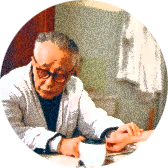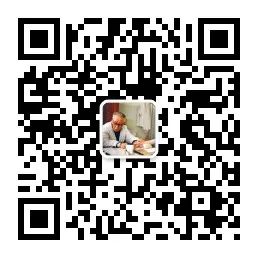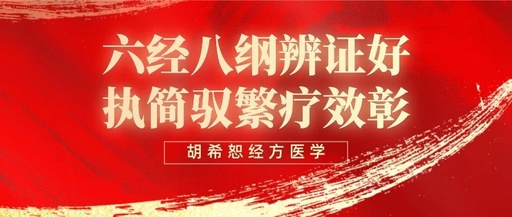
| Introduction: Neurological diseases present complex clinical manifestations. In previous articles, we shared Mr. Hu’s experiences in treating neurological disorders, particularly his effective use of Da Chai Hu Tang (Major Bupleurum Decoction) in combination with Gui Zhi Fu Ling Wan (Cinnamon Twig and Poria Pill) for adjustments. In this case study, the patient was diagnosed with multiple brain diseases, and based on the differentiation of the Six Meridians and Eight Principles, I achieved satisfactory results through a simplified approach.
Hu Xishu’s Classical Medicine
Case Sharing
Mr. Ye, male, 83 years old, first consultation date November 24, 2021. Chief complaint: The patient has experienced consciousness impairment and difficulty walking for over 2 years, worsening in the last 2 months. Medical history: Since 2019, the patient began to show symptoms of slowed movement, difficulty walking, dull response, and memory decline. He has visited the neurology departments of Xuanwu Hospital and Peking University People’s Hospital multiple times, where Western medicine diagnosed him with vascular Parkinson’s syndrome, mild cognitive impairment, multiple lacunar cerebral infarctions, leukoaraiosis, hypertension, and diabetes. Two months prior to the consultation, the patient’s condition progressed rapidly, with severe difficulty walking, only able to take 1-2 steps with assistance, requiring a wheelchair for mobility, swallowing difficulties, choking, and inability to eat normally. The community hospital provided esophageal assistance; the patient was alert but slow to respond, spoke clearly but had difficulty articulating, occasionally spoke nonsensically, had cyanosis of the lips, and produced a rattling sound in the throat. Muscle atrophy due to disuse was noted in the limbs, and joint stiffness was present. Upon further inquiry, family members reported normal sweating, sleep, and multiple episodes of apnea at night. The patient’s dietary intake was unknown, but he was fed at regular intervals and quantities. Urination was normal, slightly yellow, with one nighttime urination, and daily soft yellow stools. The tongue was dark red with a white coating, and the pulse was slippery and rapid. Differentiation analysis: The patient had no nasal congestion, runny nose, or sneezing, no body aches, and no exterior symptoms; both urination and defecation were normal, and dietary intake was acceptable, indicating no interior syndrome. The disease location was half exterior and half interior, with a slippery and rapid pulse, indicating an excess pulse, belonging to a half exterior and half interior Yang syndrome. Additionally, the patient had excessive phlegm and cyanosis of the lips, indicating phlegm and blood stasis. The differentiation of the Six Meridians indicated Shao Yang with phlegm and blood stasis. The formula was determined to be a combination of Si Ni San (Frigid Extremities Powder) and Wen Dan Tang (Warm the Gallbladder Decoction) combined with Gui Zhi Fu Ling Wan, with the following prescription: Bupleurum (Chai Hu) 12g, Bitter Orange (Zhi Qiao) 12g, Red Peony (Chi Shao) 12g, Honey-fried Licorice (Zhi Gan Cao) 10g, Bamboo Shavings (Zhu Ru) 12g, Poria (Fu Ling) 15g, Ginger-fried Pinellia (Jiang Ban Xia) 20g, Dried Tangerine Peel (Chen Pi) 20g, White Mustard Seed (Bai Jie Zi) 15g, Cinnamon Twig (Gui Zhi) 15g, Moutan Root (Dan Pi) 15g, Peach Kernel (Tao Ren) 15g
Decoction, one dose per day, divided into two servings, for 14 doses.
On December 8, second consultation: After taking the medicine, the rattling sound in the throat decreased, and the bilateral pulse was thin and rapid. The patient responded to questions more smoothly than before, but other symptoms remained unchanged. Differentiation analysis: Upon careful differentiation, considering the disease location was half exterior and half interior, and the nature of the disease was Yang, the differentiation indicated three toxins with phlegm and blood stasis. The differentiation of the Six Meridians indicated Shao Yang with phlegm and blood stasis, and the efficacy was not significant, suggesting the formula was not appropriate. Given the patient’s long-standing condition and tendency to forget, according to the “Treatise on Cold Damage” (Shang Han Lun) section 237: “In Yangming syndrome, if the person tends to forget, there must be retained blood. This is because there is long-standing blood stasis, which causes forgetfulness. Although the stool is hard, defecation is easy, and its color must be black, it is advisable to use Di Dang Tang (Resist the Toxin Decoction) to treat it.” The rapid pulse indicates that long-standing blood stasis has transformed into heat. Using only Gui Zhi Fu Ling Wan to resolve blood stasis is insufficient for a severe condition, so I added leeches and peach kernels to the Di Dang Tang. The stool was normal but slightly soft, so I omitted rhubarb. The thin pulse was due to fluid deficiency after medication, thus the differentiation indicated Xiao Chai Hu Tang (Minor Bupleurum Decoction) combined with Wen Dan Tang and Gui Zhi Fu Ling Wan with leeches, with the following prescription: Bupleurum (Chai Hu) 12g, Scutellaria (Huang Qin) 10g, Codonopsis (Dang Shen) 10g, Ginger-fried Pinellia (Jiang Ban Xia) 30g, Honey-fried Licorice (Zhi Gan Cao) 10g, Fresh Ginger (Sheng Jiang) 15g, Jujube (Da Zao) 20g, Bamboo Shavings (Zhu Ru) 15g, Dried Tangerine Peel (Chen Pi) 20g, Poria (Fu Ling) 15g, Moutan Root (Dan Pi) 20g, Peach Kernel (Tao Ren) 20g, Safflower (Hong Hua) 15g, Leeches (Shuizhi) 6g, Cinnamon Twig (Gui Zhi) 15g, Sweet Wood (Gan Song) 12g Decoction, one dose per day, divided into two servings, for 7 doses. On December 16, third consultation: After taking all 7 doses, with the assistance of a caregiver, the patient could walk 2 meters without feeling tired, and the response time to questions was significantly shorter than before. The rattling sound in the throat had basically disappeared, and the cyanosis of the lips had slightly improved. The caregiver reported that after this medication, the stool color turned black, indicating the expulsion of blood stasis, confirming the effectiveness of the treatment. The patient continued to take the 7 doses from the December 8 prescription. Results: Before finishing the 7 doses, the patient removed the gastric tube by himself, could chew and eat, and his eyes were more agile. He could respond to questions like a normal person, with improved responsiveness, and the cyanosis of the lips also showed improvement. He still needed assistance from family members to walk but no longer required a wheelchair for simple activities. I noted: The patient had a long disease course, and achieving such results in a short time surprised both me and his family. Reviewing his past medical records, he had numerous diagnoses and had taken various Western and Chinese medicines, yet his condition progressed rapidly. After taking Chinese medicine, the improvement was significant, attributed to the differentiation treatment based on the Six Meridians and Eight Principles rather than merely treating the disease. By observing, listening, questioning, and pulse-taking, I assessed the patient’s Yin-Yang, exterior-interior, cold-heat, and deficiency-excess, first determining the disease location, then differentiating the three toxins, and finally determining the formula. Treating heat with cold, cold with heat, excess with purging, and deficiency with tonifying, the corresponding formula yielded remarkable results.
Recommended Reading
-
Can the Six Meridians and Eight Principles Treat Diseases? The answer is affirmative!
-
Mr. Hu Xishu’s Teaching Records: About the Six Meridians and Eight Principles
-
Complexities of Neurological Disorders: The Wonderful Use of Bupleurum Formulas
©Copyright Statement
The content shared by this public account is for the learning and exchange of TCM professionals only.

Scan
to
follow
the
WeChat public account | Hu Xishu’s Classical Medicine
Six Meridians | Eight Principles | Formula

